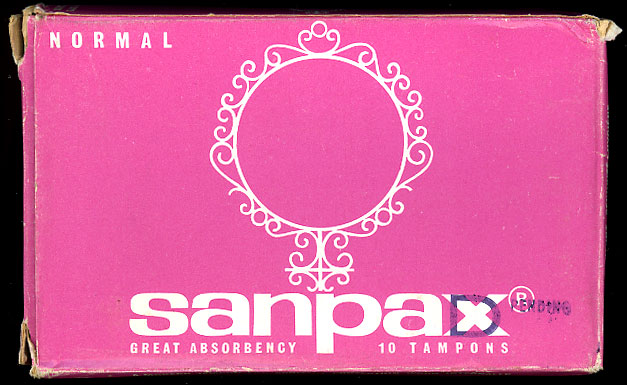See the Turkish Tampex & TamPak Tampax
imitations, 1973


|

MUSEUM OF MENSTRUATION AND WOMEN'S HEALTH
Sanpax(d?) menstrual tampons,
Switzerland? Israel? 1970
Box, tampon
& instructions
This tampon so closely resembles
the famous Tampax with its
patented two-tube applicator that
I wonder if it was a knock-off
- and I wonder if it infringed
on the Tampax patent. Did sanpax
ever hit the market?
Even the name, sanpax,
uncapitalized, with the "x"
overprinted with a "d" on the box,
sounds like Tampax (see the
comments under a picture, below).
Two Turkish deceptions, TamPak and
Tampex,
also tried to pass for Tampax. But
it could be that's simply the word
shoppers with little exposure to
tampon choices would recognize.
But an oddity is the language on
the box and inside. English and
French approximately equally split
the textual duties on the outside,
with a touch of Hebrew. But
inside, all text except for one
word is Hebrew!
It's as if we caught the makers -
on the box we read "Swiss know-how"
- in the midst of figuring out
what they wanted to do. Maybe we
did.
See what is probably a Swiss
tampon, Primella,
from the year before and which
also closely resembles Tampax. Veeery
suspicious.
Tambrands, former maker of
Tampax, kindly donated the box
as part of a large gift
from its archives after Procter
& Gamble bought the company.
|
Below:
The box measures 5.25 x
3.25 x 1.25" (13.2 x 8.2 x
3.2 cm). Someone
from the donor,
Tambrands, which made
Tampax before Procter
& Gamble bought the
company, stuck on the
label with markings.
Look! On the
white label someone also
wrote "D" over the "x"
in the name just as on
the printed names on the
box. The stamped
"pending" might refer to
the registered symbol.
|
|
 |
 |
Hebrew
appears on the box only in
this spot to the left, below,
whereas the instructions
are almost entirely in
Hebrew. Many
thanks to an e-mailer
from Northwestern
University, who
translated the Hebrew as
"Product
by sanpax in the factory
for hygiene products,
Ashdod."
Wikipedia writes this
about Ashdod
(I added the color):
"[Ashdod,] located in the
South District of Israel,
on the Mediterranean Sea
coast, is a city of over
200,000 people located
approximately
70 kilometers
(43 mi) from
Jerusalem and Beer Sheba.
Ashdod is an important
regional industrial
center. The Port of Ashdod
is Israel's largest port
accounting for sixty
percent of the country's
imported goods.
"The first documented
settlement in Ashdod dates
to the Canaanite culture
of 17th century BC,[1]
making the city one of
the most ancient in the
world. Ashdod
is mentioned thirteen
times in the Bible.
During the history the
city was settled by
Philistines, Israelites,
Byzantines, Crusaders and
Arabs.[2]
"Modern Ashdod was
established in 1956 on the
sand hills near the
archeological site, and
incorporated as a city in
1968, with a land-area of
approximately
60 square kilometers
(23.2 sq mi). .
. ."
Could its location in sand
hills have influenced the
name sanpax?
And that overprinted D -
sand
- strikes me as
suspicious. Naaaa, that's
overinterpreting and too
much fun.
I
just have to say this:
Wikipedia says that the
American sister city of
Ashdod is Tampa,
Florida. Add an "x" to
Tampa and you get
------, a competitor of
sanpax and a for-sure
question at the Museum
of Menstruation
Christmas - er,
Hanukkah, that is, Winter
- Ball Quiz Competition.
Whoopee!
|
|
 |
 |
Below:
The ends. "The
first easy-to-use
tampon"? Huh? How about
Tampax, which started
over 35 years before and
which sanpax(d) seems to
duplicate (see the tampon
itself)?
"Swiss know-how" - I
wonder what that refers
to. It doesn't translate
"brevet suisse," at right,
which means "Swiss
patent." Maybe it means
obtaining a patent shows
know-how. But it seems
odd.
|
|
|
|
Next
| Box -
tampons
- instructions - See the Turkish
Tampex & TamPak Tampax
imitations
1973 - Tampax
tampon from the early 1930s
- Main Tampax patent
- Ad
from 1936 - World War II Tampax sign - Japanese
tampon with finger cots
© 2007 Harry Finley. It is
illegal to reproduce or distribute
any of the work on
this Web site in any manner or
medium without written permission
of the
author. Please report suspected
violations to hfinley@mum.org
|
|